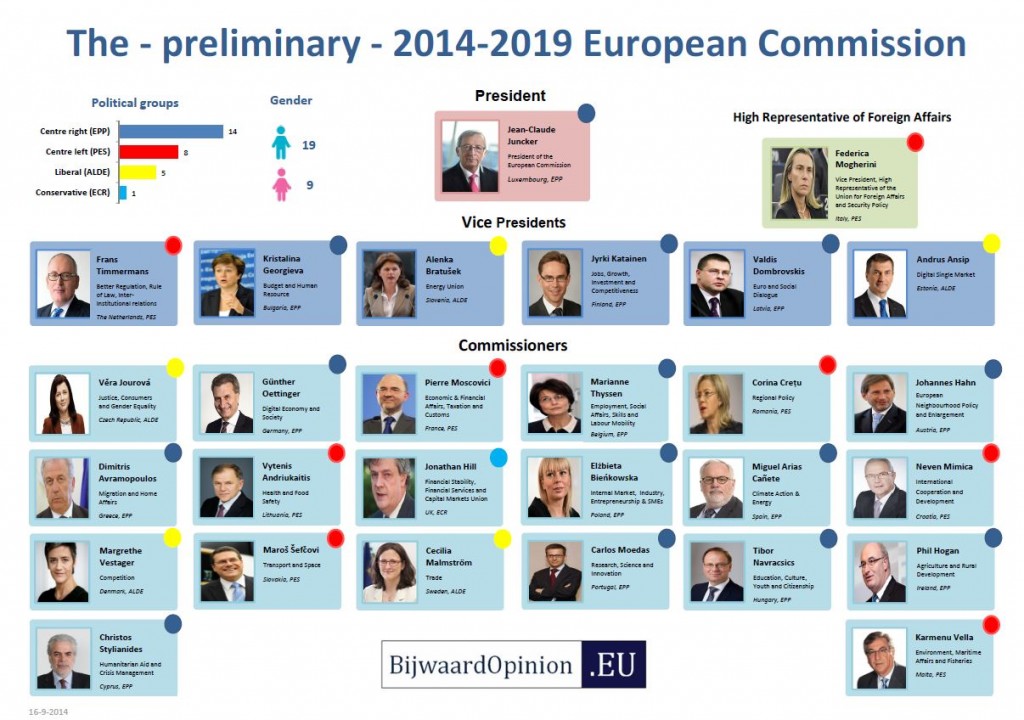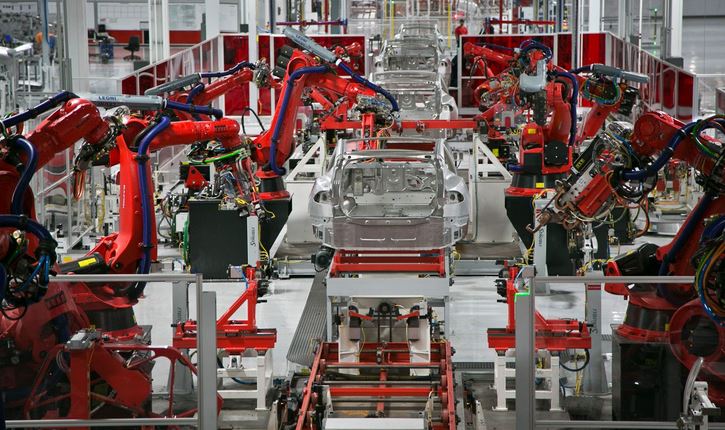Europe a paradise? When in 2004 American author Jeremy Rifkin wrote his book “The European Dream” this was a bold statement, but also a statement that did not appear that far-fetched. Why wouldn’t the European Union, with its social market economy and ‘soft power’, become a model for the 21st century world? Ten years later this kind of optimism about Europe’s future is rare to say the least. “The power of paradise” [“De kracht van het paradijs” in Dutch], the title of the recent book of Flemish Professor Jonathan Holslag, is therefore remarkable. Does Holslag go against the dominant Eurosceptic flow? Yes and no. Yes, because “The power of paradise” is a pro-European book in which Hoslag encourages EU Member States to integrate further. No, because Holslag mercilessly exposes Europe’s European economic, political and military decline. Continue reading [in Dutch]…
The 2014-2019 ‘Juncker’ European Commission
At the end of September the hearings by the European Parliament of the Commissioners-designates for the 2014-2019 European Commission will get under way. After having been ‘grilled’, by the European Parliament, the new ‘Juncker Commission’ is expected to take office on 1 November. Worth reading are this EurActiv article on who will hold real power among the 28 new Commissioners, and this EUobserver article on the new power structure of the Juncker Commission. Click on the picture above for my own overview of the Commissioners-designates.
Iran & the European Union’s search for energy diversification
No matter what the outcome of the Ukrainian crisis will be, it seems certain that the relations between the European Union and Russia will remain frosty for the foreseeable future. This will in particular influence the EU’s energy policy, with some previously unthinkable options for energy diversification now becoming feasible. One of these less obvious energy diversification options for European countries may be importing gas from Iran, a country long seen as an enemy of the West, but with the world’s second largest gas reserves. Continue reading…
‘The second machine age’: will automation lead to increasing inequality?
In this thought-provoking article, published in the July/August Foreign Affairs, it is argued that the scarcest, and hence the most valuable, resource in the coming digital era will be neither ordinary labour nor ordinary (physical) capital, but people who can create new ideas and innovations. In this ‘automated economy’, a relatively small number of highly qualified economic ‘top performers’ may reap a disproportionate share of the rewards.:
“The distribution of income for this creative class typically takes the form of a power law, with a small number of winners capturing most of the rewards and a long tail consisting of the rest of the participants. So in the future, ideas will be the real scarce inputs in the world — scarcer than both labor and capital — and the few who provide good ideas will reap huge rewards. Assuring an acceptable standard of living for the rest and building inclusive economies and societies will become increasingly important challenges in the years to come.” Link to the article
The new ‘German question’?
Can Germany lead the European Union out of the economic crisis? The British historian Timothy Garton Ash writes in this interesting article that this is the ‘German question’of our time:
“There is a new German question. It is this: Can Europe’s most powerful country lead the way in building both a sustainable, internationally competitive eurozone and a strong, internationally credible European Union? Germany’s difficulties in responding convincingly to this challenge are partly the result of earlier German questions and the solutions found to them. Yesterday’s answers have sown the seeds of today’s question…” Link to the acrticle
Wetenschappelijke onderbouwing ‘Austerity’ onder vuur
Volgens de Amerikaanse econoom en Nobelprijswinnaar Paul Krugman is hier alle reden toe. ‘Austerity’ zou zijn gebaseerd op een rekenfout:
“In normal times, an arithmetic mistake in an economics paper would be a complete nonevent as far as the wider world was concerned. But in April 2013, the discovery of such a mistake—actually, a coding error in a spreadsheet, coupled with several other flaws in the analysis—not only became the talk of the economics profession, but made headlines. Looking back, we might even conclude that it changed the course of policy…” Lees verder
Schaliegas: Het Westen te vroeg afgeschreven?
Volgens dit artikel op Project Syndicate wel, en dit dankzij de ‘schaliegasrevolutie’. Hoogleraar Internationale Betrekkingen Anne-Marie Slaughter voorziet in dit artikel zelfs een komende ‘Atlantische Eeuw’, dankzij deze opmerkelijke wending op energiegebied.:
“The United States is rising; Europe is stabilizing; and both are moving closer together. That was the principal message earlier this month at the annual Munich Security Conference (MSC),… The participants come primarily from Europe and the US; indeed, when the conference began in 1963, it was focused entirely on NATO members. This year, however, senior government officials from Brazil, China, India, Nigeria, Singapore, Qatar, and Saudi Arabia also joined, an important sign of the times…” Lees verder
Boekbespreking: Duco Hellema, Nederland en de jaren zeventig
Wat was kenmerkend voor de jaren zeventig, Dolle Mina of de opkomst van de Evangelische Omroep? Oftewel, vormden de jaren zeventig in Nederland een hoogtepunt van de progressieve protestbeweging, of was dit een decennium waarin een hernieuwd conservatisme op de voorgrond trad? Hoogleraar Internationale Betrekkingen Duco Hellema geeft in zijn nieuwe boek Nederland en de jaren zeventig weer hoe de jaren zeventig in Nederland inderdaad een ‘rood’ decennium waren, maar dat tegelijk ook de conservatieve en neoliberale golf van de volgende decennia begon aan te zwellen. Lees verder…
Voor Blair EU ‘brutal Realpolitik’
De voormalige Britse premier Tony Blair waarschuwt tegen een ‘Brexit’. De voorstanders van een Brits uittreden uit de EU zouden volgens hem slechts kijken naar de korte termijn. Blair ontkent de ‘design flaws’ in de EU niet, maar stelt dat op de langere termijn een sterke EU enorme voordelen voor het Verenigd Koninkrijk zou opleveren in een snel veranderende wereld:
“Power is shifting from West to East. China has a population that is three times larger than that of the EU and an economy that will eventually be the world’s largest. India has more than a billion people. Indonesia’s population is three times that of the largest European country, and a host of countries – including Russia, Brazil, Mexico, Vietnam, the Philippines, and Egypt – have more people today than any EU member state. CommentsThis is crucial, because, as technology and capital become globally mobile, a realignment of GDP and population will occur: the larger a country’s population, the bigger its economy….”
Blair ziet een pro-Europese houding dan ook niet als idealisme, maar als ‘Brutal realpolitik’ en als bittere noodzaak voor alle Europese landen, inclusief dat van hemzelf:
“The case for the EU today is that member countries, including Britain, need its heft in order to leverage power in economics, trade, defense, and foreign policy, as well as to address global challenges like climate change. The EU gives Britain a weight collectively that it lacks on its own…” Lees verder
Boekbespreking: H.L. Wesseling, De man die nee zei, Charles de Gaulle 1890-1970
Charles de Gaulle heeft de status van oorlogsheld, maar zijn politieke rol na de Oorlog is controversieel geweest. Dit was zeker het geval in Nederland, waar De Gaulle het prototype was van de arrogante fransman. In zijn zeer aan te bevelen boek over De Gaulle, ‘De man die nee zei’, geeft de historicus H.L. Wesseling aan hoe dit imago tot stand kwam en waarom De Gaulle niettemin een groot staatsman was met een cruciale rol in de vorming van het moderne Frankrijk en Europa. Lees verder…



